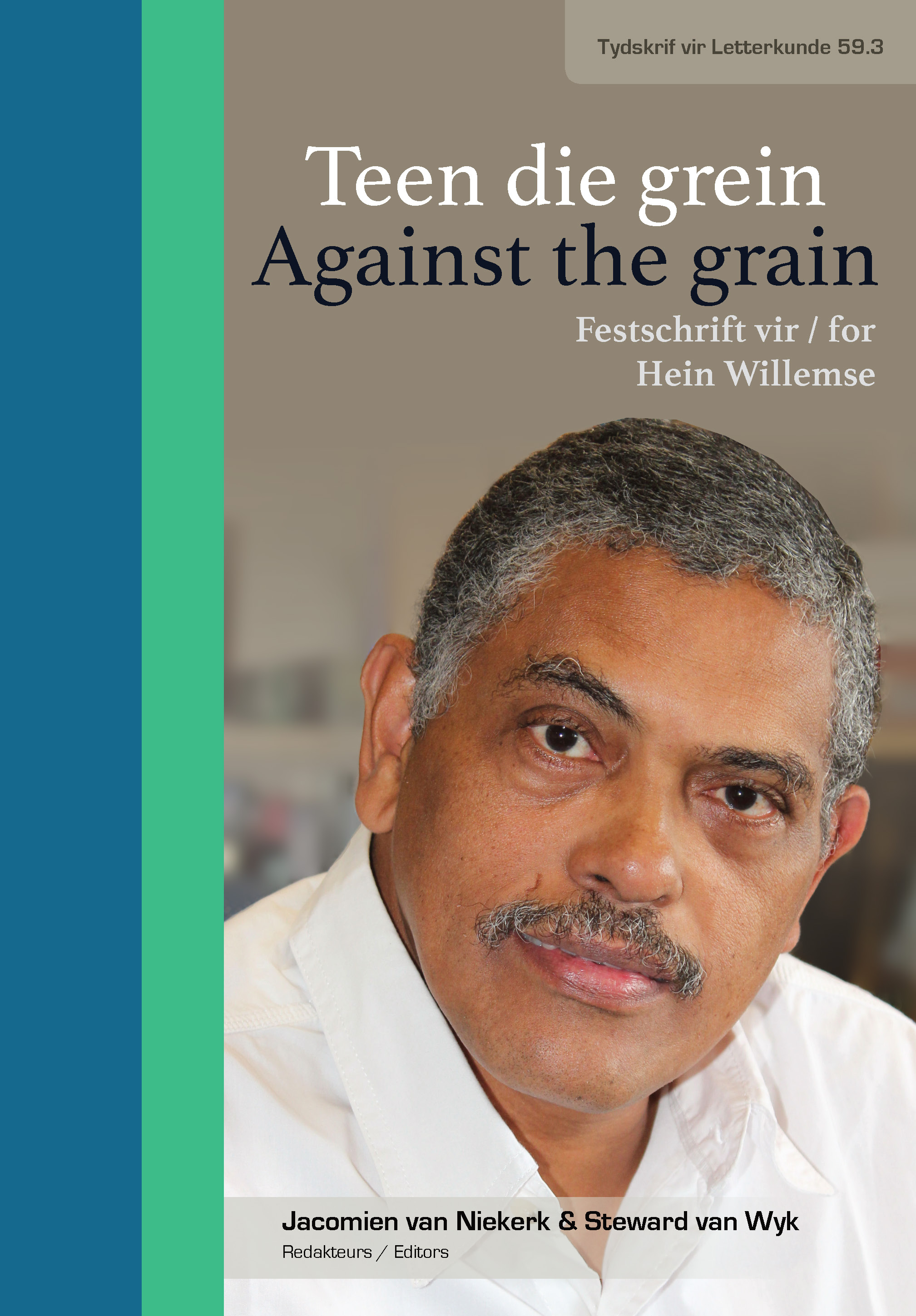Some new perspectives on the Soweto uprising: H. M. L. Lentsoane’s poem “Black Wednesday” (“Laboraro le lesoleso”)
DOI:
https://doi.org/10.17159/tl.v59i3.12197Keywords:
H. M. L. Lentsoane, “Laboraro le lesoleso”, “Black Wednesday”, Soweto uprising , Black Consciousness poetryAbstract
The epic poem about the Soweto uprising, “Laboraro le lesoleso”, written in Sepedi (Northern Sotho) by H. M. L. Lentsoane has only recently been translated into English by Biki Lepota as “Black Wednesday” and published in the anthology Stitching a whirlwind (2018). In this article I suggest that, by discarding English, some crucial shifts from the bulk of protest poetry written in English must have taken place. Lentsoane wants to speak directly to fellow mother tongue speakers and not a national or broader African or international ear. It becomes clear that, by deploying various strategies based in orality, the poet manages to contribute new material and new approaches to creative texts of black protest during the apartheid years, e.g., a release from specific apartheid content about their oppression that every indigenous speaker had common knowledge of; an adherence to orality in terms of presentation, vocabulary, and form; and a linkage with the ancestors and a release from trying to reach the conscience of whites. This manifests through the poem’s particular perspective and emphasis as narrative, as telling, combined with vivid visceral poetic imagery of the event. The poem evocatively captures the unfolding of incidents while at the same time shifting the focus to an ancestral demand to stand up for righteousness in a universal field of justice.
Downloads
References
Chapman, Michael, et al. “Literary historiography/Literatuurgeskiedskrywing.” Journal of Literary Studies vol. 13, no. 1–2, 1997, pp. 210–53. DOI: https://doi.org/10.1080/02564719708530168.
Coplan, David B. In the Time of Cannibals; The Word Music of South Africa’s Basotho Migrants. U P, 1994.
Field, Sean. “Oral Histories—the Art of the Possible.” African Oral Literature: functions in contemporary contexts, edited by Russell H. Kaschula. Ince, 2001, pp. 249–56.
Furniss, Graham. “Language, Truth and Rhetoric in the Constitution of Orality.” African Oral Literature—functions in contemporary contexts, edited by Russell H. Kaschula. Ince, 2001, pp. 191–203.
Gwala, Mafika Pascal . Collected Poems, edited by M. Langa & A. Sitas. South African History Online, 2016. https://www.sahistory.org.za/archive/collected-poems-mafika-pascal-gwala-edited-mandla-langa-and-ari-sitas.
Hall, Megan & Antjie Krog (eds). Stitching a Whirlwind: An Anthology of Southern African Poems and Translations. Africa Pulse Series. Oxford U P, 2018.
Hirson, Baruch. Year of Fire, Year of Ash. The Soweto Revolt: Roots of a Revolution? Zed, 1981.
Hofmeyr, Isabel. We Spend Our Years as a Tale that is Told. Witwatersrand U P, 1993.
Krog, Antjie. “Indigenous Texts, Rich Points and Pluriversal Sources of Knowledge: Siswana-sibomvana.” Language and Decoloniality in Higher Education, edited by Z. Bock & C. Stroud. Bloomsbury, 2021, pp. 47–66.
Krog, Antjie. Met woorde soos met kerse. Kwela, 2002.
Lehong, Miriam Ditaba. “Language of Poetry in H. M. L. Lentsoane’s Poetry.” MA thesis. Vista U, 1996.
Maahlamela, Teboho. “Sepedi Oral Poetry with Reference to Kiba Traditional Dance of South Africa.” Diss. Rhodes U, 2017. http://hdl.handle.net/10962/63209.
Mampa, Sexton Maruruele. “The study of themes and expressions in the poetry of H. M. L. Lentsoane.” MA thesis. UNISA, 1992. https://hdl.handle.net/10500/27948.
Matsepe, O. K. Megokgo ya Bjoko. Educum, 1968.
Mbao, Wamuwi. Years of Fire and Ash—South African Poems of Decolonisation. Ad Donker, 2021.
Mojalefa, M. J. “The verse-form of Northern Sotho oral poetry.” Literator vol. 13, no. 2, 2002, pp. 85–95. DOI: https://doi.org/10.4102/lit.v23i1.322.
Ndlovu, Sifiso M., Noor Nieftagodien & Tshepo Moloi. “The Soweto Uprising.” The Road to Democracy in South Africa Volume 2 (1970–1980), edited by South African Democracy Education Trust. UNISA P, 2011, pp. 317–68.
Ngwenya, Thengani H. “Black Consciousness poetry: writing against apartheid.” The Cambridge History of South African Literature, edited by D. Attwell & D. Attridge. Cambridge U P, 2012, pp. 500–22.
Ntuli, D. B. Z. & C. F. Swanepoel. African Literature in African Languages. A Concise Historical Perspective. Nasou/Via Afrika, 1993.
Peterson, Bhekizizwe. “Black writers and the historical novel: 1907–1948.” The Cambridge History of South African Literature, edited by David Attwell & Derek Attridge. Cambridge U P, 2012, pp. 291–308.
Pohlandt-McCormick, Helena. “‘I Saw a Nightmare …’: Violence and the Construction of Memory (Soweto, June 16, 1976).” History and Theory vol. 39, no. 4, 2000, pp. 23–44. https://www.jstor.org/stable/2678048.
Pohlandt-McCormick, Helena. “Official Stories: Telling Soweto, June 16, 1976—The Appropriation of the People’s Story into Official Histories. Part 1: Commission of Inquiry into the Riots at Soweto and Elsewhere (Cillié) from the 16 June, 1976–28 February, 1977.” “I Saw a Nightmare…”. Doing Violence to Memory: The Soweto Uprising, June 16, 1976. Columbia U P, 2005. E-book. http://www.gutenberg-e.org/pohlandt-mccormick/PM.c3p3.html#04 .
Pretorius, W. J. Aspects of Northern Sotho Poetry. Via Afrika, 1989.
Sitole, Nomhle N. “The influence of initiation schools on adolescent knowledge and attitudes towards HIV/AIDS and gender related issues in the Maluti Area, Eastern Cape.” MA Thesis. U KwaZulu-Natal, 2007. http://hdl.handle.net/10413/5356.
Published
Issue
Section
License
Copyright (c) 2022 Tydskrif vir Letterkunde

This work is licensed under a Creative Commons Attribution-ShareAlike 4.0 International License.


 https://orcid.org/0000-0001-6465-6584
https://orcid.org/0000-0001-6465-6584


.png)